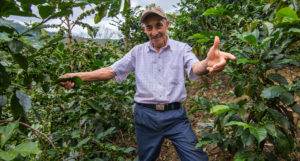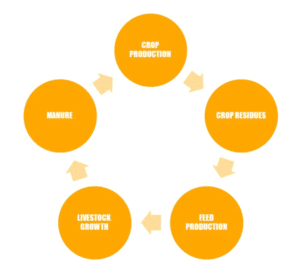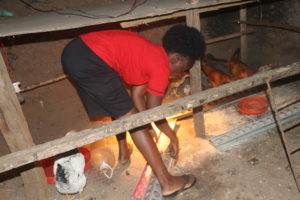Coronavirus has highlighted fundamental weaknesses in our food system that are now leading to food insecurity. But even before this, the food system was failing people and the planet. As we build back after the pandemic, we have an opportunity to create change that is anything but normal.
Our previous article looked at the problems with the current systems, as experienced by smallholder farmers in developing countries. In this second article we explore how we’re already working with farmers, together with businesses and enlightened governments, to create a system that looks quite different. A system that builds on local knowledge and social systems, is more resilient to climate change, protects environmental resources, provides decent livelihoods and secures food supplies in all countries. Most fundamentally, our agriculture and food systems must work for the vast number of smallholder farmers. This is our call to action to make this a reality, built on three central pillars:
#1 Making agriculture work – despite the new climate reality
Agriculture needs to protect environmental resources AND deliver reliable harvests in the face of climate change. It has to do both for food security and incomes. One without the other is not enough. We cannot simply focus on increasing productivity, but must take care of the entire ecosystem on which agriculture depends to maintain, and even restore natural resources (soil, water, biodiversity). This form of agriculture is often called regenerative agriculture and some of the ways it is being put into practice across Practical Action’s programmes are described below.
“Scientific and technological ‘solutions’ which poison the environment or degrade the social structure and man himself are of no benefit, no matter how brilliantly conceived or how great their superficial attraction”
– Practical Action Founder, E.F. Schumacher
Enhancing soils
Whilst the widespread mis-management of artificial fertiliser is degrading soils and reducing yields, in Zimbabwe, farmers are bucking the trend. In the Makkoni, Mutare and Mutasa regions, over 10,000 farmers, working with Practical Action have promoted Pfumundza, a suite of indigenous practises including mulching, composting and inter-cropping that help retain moisture, protect young plants and enhance soil fertility and structure. The costs incurred from artificial inputs such as fertiliser have been much reduced and yields have been higher for the past 5 years, compared to fields which only follow ‘conventional’ farming. According to Henry. T. Muchedzi from Practical Action Zimababwe, “Using organic inputs like manure and compost, farmers obtain enough maize for a year from much smaller plots than before. Workloads are also reduced bringing benefits for women who often are responsible for much agricultural labour”. Soil and crop management practises, such as these, are recognised by the Global Commission on Adaptation[1] and others as being a critical strategy for improving resilience to climate change.
Sustainable land use
Forest clearance for agriculture is a global catastrophe but in Peru, it is being rejected for sustainable alternatives that grow coffee in the cloud forests. In the San Martin area, Practical Action supports the development of a system of farming that takes place within existing tree cover: coffee, other food crops and forest trees co-exist in a system that is productive for all of them. The approach has been successful in restoring degraded forests – which has kept land in production, assisted food security and contributed to the maintenance of an important ‘carbon sink’. Meanwhile coffee yields have doubled in three years.

Genaro saw how traditional farming techniques damaged the environment. Now he’s earning a much better income while protecting natural resources.
Improving diversity and nutrition
In Zimbabwe and Malawi, Practical Action support the reintroduction of local seeds threatened in recent years by the aggressive promotion of patented hybrid seeds. Annual seed fairs allow farmers to exchange seeds and community seed banks enable them to protect local seeds and maintain quality. By maintaining and improving this practise, the nutritional range of local diets is improved, bio-diversity increases (which can reduce pre-harvest losses from pests), farmers have a more diverse source of income and resilience to climate change is improved.
Boosting productivity with renewable energy
As long as it is integrated with approaches that maintain the soil, solar irrigation provides a real opportunity to expand cultivated areas, extend the growing season and ensure reliability of produce for markets. For instance in a Practical Action solar irrigation project in Ddang Disrtict of Nepal, farmers have increased the number of harvests each year from one to three, improving food security but also stimulating local horticultural markets. Across our programming we are exploring business models that make this sort of development commercially viable and capable of reaching scale.
“Irrigation can change people’s lives in Nepal and solar power provides a means to help poorer farmers get access to irrigation even in geographically challenged areas”
– Menila Kharel, Practical Action Nepal
#2 Making agriculture pay – especially for women and young people
The days of romanticising small scale farming are over. Farming is a business and farmers need to be an integral part of an economic system that rewards them and other market actors fairly and over the long term. Rural areas need to be hubs of diversification, employment and flourishing business so that everyone can thrive.
Agriculture must ‘pay’ in a way that delivers a decent livelihood to smallholder farmers and creates opportunities for women and young people. This cannot happen piecemeal, it requires an economic system that delivers this, and delivers it in ways that stimulate regenerative agriculture, food security and resilience to climate change.
Circular Economies
We believe that the answer lies in creating business opportunities within a circular economy – an economy in which we recognise the finite nature of our natural resources and constantly re-circulate, re-use and minimise waste.

A circular economy approach can be applied on the farm and within rural businesses that complement the farm, as well as at a global business or country level.
As an example of what this looks like in practise: in the Lake Victoria Basin in Kenya, Practical Action work with businesses that produce livestock feed (e.g. black fly maggots) from a combination of crop residues and local household waste. A virtuous circle that links production and waste generation is created (see diagram). This process creates jobs, supports regenerative agriculture, improves productivity and diversifies farmers’ incomes.
Circular economy principles help redress the balance between global and local value chains, placing equal importance on shorter value chains in which food production and consumption are closer together. This stimulates the local economy and because ‘food miles’ are reduced, pollution is reduced, and a better range of nutritional foods are available locally. A greater focus on shorter value chains can also make the food system less vulnerable to shocks such as coronavirus and more able to support local food security, without losing out on global markets. A circular economy literally has multiple ‘wins’ – jobs, environment, regenerative agriculture, nutrition.
“Modern economics does not distinguish between renewable and non-renewable materials, as its very method is to equalise and quantify everything by means of a money price.”
– Practical Action Founder, E.F. Schumacher

Young poultry farmers are integrating their businesses into local supply chains.
Connecting farmers with commercial markets
For this to deliver decent livelihood for smallholders farmers, they need to be integrated into commercial supply chains. This often requires change by companies and by producers themselves.
In Kenya Practical Action support groups of young poultry farmers to organise and aggregate produce which then helps them to connect to companies in the food sector. Parallel to this, Practical Action works with poultry processing companies, hatcheries and financial institutions, helping them develop business practises that help young farmers and entrepreneurs.
Offgrid renewable energy
As its reliability and affordability improves every day, offgrid renewable energy is an increasingly viable option for developing countries. Renewable energy can stimulate the creation of businesses that allow smallholder farmers to diversify and increase their incomes, and provide opportunities for women and young people.
For instance in Senegal Practical Action are supporting the development of ground nut oil and milling businesses, both powered by solar energy. Both types of enterprise are run by women who now employ men to run some of the machinery, contributing to improved incomes as well as shifting gender norms. This not only benefits the women running the business, it presents opportunities for farmers in the area to add value to their produce and increase their incomes.
“To talk about the future is useful only if it leads to action now.”
– Practical Action Founder, E.F. Schumacher
#3 Making big change possible
But a few cosy examples of sustainable agriculture, and small scale enterprises that benefit small numbers of people, are not enough. Change is needed at scale. Change that involves challenging convention, so this radically different approach is adopted by the private sector and Governments. All of the examples above will be meaningless if they cannot happen on a large scale. And that requires bold collaborations, involving the public and private sector, to create an environment that enables smallholder farmers and businesses to move in this direction.
Multi-stakeholder collaboration
Individual companies can undoubtedly make a big difference, particularly by challenging norms about how business should act and stimulating others to follow their lead. An example of this is the new commitment made to support sustainable agriculture and climate change by Unilever. However ultimately action is needed from a multitude of actors across whole sectors.
To achieve this, in Kenya, Practical Action facilitate multi stakeholder platforms bringing together everyone involved in the supply chains of poultry, tomatoes and groundnuts. This includes buyers, processors, financial institutions, service providers and of course, farmer organisations. By building trust between these actors and a common purpose, norms are changing. Collaborations that promote regenerative agriculture, youth opportunities and the growth of the market are developing.
Addressing the blind spots
The focus on artificial inputs, especially fertiliser, in an effort to increase productivity at all costs has been a blind spot in the agricultural development policies of many countries. But this can change.
In Nepal Practical Action are facilitating a national platform to take action on improving levels of soil organic matter – a cornerstone of regenerative agriculture. Collaborations between public and private sector actors are being developed including; the development of public and private soil testing services; integration of soil organic matter improvement into national and local level plans and budgets; and research and development to encourage organic fertiliser and composting businesses.
“It is truly encouraging to see that the private sector, Government and other stakeholders can collaborate to take serious action on the issues of soil health and soil organic matter”
– Menila Kharel, Practical Action Nepal
Policies that support a paradigm shift
Dependence on chemical fertiliser is one part of intensive industrialised agriculture that has blighted the world. This can change and Governments can take a lead in driving a paradigm shift. Signs of this are apparent in Zimbabwe where Practical Action brought together stakeholders with an interest in regenerative agriculture to influence Government policy. As a result the Government has made commitments to support a transition to a more resilient and sustainable agricultural system. A Pfumundza national task force has been created to support this process.
Communal farmers who practise regenerative farming techniques (also known as Pfumvudza) are able to boost production to meet their own personal needs, grow cash crops for commercial markets, and contribute to strategic grain reserves. These examples all show that it is possible to galvanise institutions, including the private sector, on these issues. Change at scale really is possible.
What’s possible is infinitely better
There is a moment of opportunity right now to create big change that is anything but normal.
Where everyone has enough nutritious food
Where smallholder farmers earn a decent living
Where vibrant rural economies create opportunity
Where we protect the environment and build climate resilience
Where the world works better for everyone
Over 50 years ago our founder Fritz Schumacher was labelled as a crank, and his thinking around economic growth, wellbeing and sustainability was firmly rejected by the mainstream. Today his ideas have finally come of age. We have over 50 years’ experience of putting those alternative ideas into practice and sharing what works with others. This is a call to action to the private sector, governments and investors to seize this opportunity and join us on the journey.

John Chettleborough is the Agriculture and Markets Lead for Practical Action Consulting. His work focuses on developing market systems and private sector models that support low input regenerative agriculture and the integration of renewable energy into the agricultural sector.
[1] Sinclair F, Wezel A, Mbor C, Chomba S, Robiglio V and Harrison R, Background Paper, World Agroforestry (ICRAF) / Global Commission on Adaptation, Rotterdam and Washington DC, 2019
